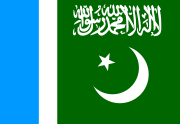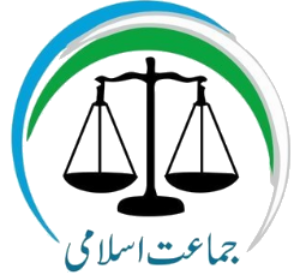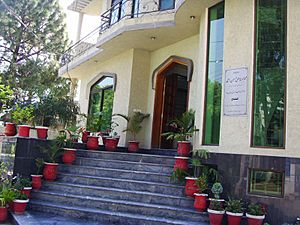Jamaat-e-Islami Pakistan facts for kids
Quick facts for kids
Jamaat-e-Islami Pakistan
Islamic Assembly of Pakistan جماعت اسلامی پاکستان
|
|
|---|---|
 |
|
| Abbreviation | JIP |
| Leader | Hafiz Naeem ur Rehman |
| Secretary-General | Ameer-ul-Azeem |
| Naib Emir(s) |
|
| Founder | Abul A'la Maududi |
| Founded | 1947 |
| Preceded by | Jamaat-e-Islami |
| Headquarters | Multan Road, Mansoorah, Lahore, Lahore |
| Newspaper | Daily Jasarat |
| Student wing | Islami Jamiat-e-Talaba |
| Youth wing | JI Youth |
| Women's wing | Jamaat-e-Islami Women's Wing |
| Labour wing | National Labour Federation (Pakistan) |
| Welfare Wing | Alkhidmat Foundation Pakistan |
| Research Wing | The Islamic Foundation |
| Ideology | Islamism Islamic democracy Pan-Islamism Islamic revivalism Social conservatism |
| Political position | Right-wing |
| National affiliation | MMA TTAP HDTB |
| International affiliation | Muslim Brotherhood JI (Hind) JI (Kashmir) JI Bangladesh UK Islamic Mission |
| Colors | Green, white, blue |
| Senate |
0 / 100
|
| National Assembly of Pakistan |
0 / 336
|
| Provincial Assembly of Balochistan |
1 / 65
|
| Provincial Assembly of Khyber Pakhtunkhwa |
0 / 128
|
| Provincial Assembly of Sindh |
1 / 168
|
| Provincial Assembly of Punjab |
0 / 371
|
| Gilgit-Baltistan Legislative Assembly |
0 / 33
|
| Azad Kashmir Legislative Assembly |
0 / 49
|
| Election symbol | |
Pan balance |
|
| Party flag | |
 |
|

Jamaat-e-Islami Pakistan (JIP) is a political party in Pakistan that follows Islamic principles. It is the Pakistani branch of the original Jamaat-e-Islami party, which started in colonial India in 1941.
JIP is known as a "vanguard party." This means its members are meant to be leaders who spread the party's ideas and influence. People who support the party but are not full members can become "affiliates" or "sympathizers." The main leader of the party is called an "Ameer."
Even though JIP might not have a huge number of followers, it is very influential. It is considered one of the important Islamic movements in Pakistan.
The original Jamaat-e-Islami was founded in Islamia Park, Lahore, British India in 1941. Its founder was Abul Ala Maududi, a Muslim thinker. He was inspired by the rule of the Mughal Emperor Aurangzeb, which was based on Sharia law. When India was becoming independent, Maududi and Jamaat-e-Islami did not want India to be divided.
In 1947, after India was split into two countries, the Jamaat party also divided. It became Jamaat-e-Islami Pakistan and Jamaat-e-Islami Hind (the Indian part). Other branches of Jamaat include Jamaat-e-Islami Kashmir, started in 1953, Jamaat-e-Islami Azad Kashmir (1974), and Bangladesh Jamaat-e-Islami (1975).
In its early years, Jamaat-e-Islami Pakistan faced tough times from the government in 1948, 1953, and 1963. However, during the time of General Muhammad Zia-ul-Haq, JIP's standing improved. It was seen as a key supporter of the government's ideas. Party members sometimes held important government jobs, like in information, production, and natural resources.
In 1971, during the Bangladesh Liberation War, JIP did not support Bangladesh becoming independent. But in 1975, it helped create Jamaat-e-Islami Bangladesh. Since the early 1980s, JIP has also worked closely with Jamaat-e-Islami Kashmir.
Contents
- The Party's Journey: A Look at Its History
- How JIP is Organized
- Leaders of JIP
- Images for kids
- See also
The Party's Journey: A Look at Its History
| Year | Members (Arkan) |
Sympathizers and workers (Hum-Khayal) |
|---|---|---|
| 1941 | 75 | (unknown) |
| 1951 | 659 | 2,913 |
| 1989 | 5,723 | 305,792 |
| 2003 | 16,033 | 4.5 million |
| 2017 | 37000 | (unknown) |
| SOURCE: Encyclopedia of Islam & the Muslim World (2004) | ||
Abul A'la Maududi: The Founder (1941–1972)
Abul A'la Maududi was the founder and leader of Jamaat-e-Islami until 1972. He was a well-known Islamic thinker and writer. He wrote a lot about the role of Islam in South Asia. His ideas were shaped by events like the Khilafat Movement and the end of the Ottoman Caliphate. He also thought about how Indian Nationalism and Hinduism affected Muslims in India.
Maududi believed in "Islamization from above." This meant creating an Islamic state where God's law (sharia) would be followed. He thought that politics was a key part of the Islamic faith. He believed that building an Islamic state would help solve many social and economic problems for Muslims.
Maududi was against British rule in India. However, he also did not support the Muslim nationalist movement. He felt that nationalism was not Islamic. Instead, he wanted an "Islamic state" that would cover all of India. This was even though Muslims were only about a quarter of India's population.
Jamaat-e-Islami actively did not support the division of India. Maududi argued that splitting India went against the Islamic idea of the ummah (the global Muslim community). The party believed that dividing India would create borders that would separate Muslims from each other.
How JIP Started in Colonial India
Jamaat-e-Islami was founded in colonial India on August 26, 1941. The first meeting took place at Islamia Park in Lahore, before India was divided. JIP began as a social and political movement based on Islamic ideas. Seventy-five people attended the first meeting and became the first members. Among the founders were Maulana Amin Ahsan Islahi, Maulana Naeem Siddiqui, and Maulana Muhammad Manzoor Naumanai.
Maududi saw his group as a leading force for an Islamic change. He wanted them to follow the example of early Muslims who built an Islamic state in Medina. JIP was, and still is, organized in a strict, pyramid-like way. Everyone works towards the goal of creating an Islamic society. They do this mainly through education and social work, under the leadership of their emirs (leaders).
The leader (emir) must talk with a council called the shura. JIP also created groups for women and students. In its early days, JIP helped in refugee camps. They did social work, opened hospitals, and collected animal skins during Eid-ul-Azha to help others.
JIP had some unique features. All members, including Maududi, said the shahadah when they joined. This was a symbolic way of showing their commitment to a new Islamic way of thinking. After Pakistan was formed, JIP said that Pakistanis should not promise loyalty to the state until it became Islamic. They believed a Muslim should only be truly loyal to God.
JIP in Pakistan
Founding and Early Years
After India was divided, Maududi and JIP moved from East Punjab to Lahore in Pakistan. There, they helped thousands of refugees coming from India. They did social work, opened hospitals and clinics, and collected animal skins during Eid-ul-Azha.
When Huseyn Shaheed Suhrawardy was Prime Minister (1956–1957), JIP wanted different voting systems for different religious groups. Suhrawardy's party passed a law for a mixed voting system.
In 1951, JIP ran in elections but did not win many seats. They found more success by promoting their ideas in public. The election also caused a disagreement within the party. The JIP council wanted to stop being involved in politics, but Maududi wanted to continue. Maududi's view won, and some senior JIP leaders left the party. This made Maududi's position even stronger.
In 1953, JIP led protests against the Ahmadiyya community. JIP believed Ahmadis should not be considered Muslims. In March 1953, protests in Lahore led to unrest and the declaration of martial law. Maududi was arrested and sentenced to death for writing against the Ahmadiyya. Many JIP supporters were put in prison.
The 1956 Constitution was created, and it included many of JIP's demands. Maududi supported the constitution, calling it a victory for Islam. In 1958, JIP formed an alliance with other parties. This alliance made the government unstable, and Pakistan went back to martial law.
The military ruler, President Muhammad Ayub Khan (1958–1964), wanted to modernize the country. He did not want religion to be involved in politics. He banned political parties and warned Maududi to stop his religious and political activities. JIP offices were closed, funds were taken, and Maududi was imprisoned in 1964 and 1967.
JIP supported the opposition party, the Pakistan Democratic Movement (PDM). In the 1964–1965 presidential elections, JIP supported Fatima Jinnah. This was notable because JIP usually did not support women in politics.
In 1965, during the Indo-Pakistani war, JIP supported the government's call for a holy struggle. They gave patriotic speeches on Radio Pakistan and sought support from other Muslim countries. The group also opposed the socialist ideas of Zulfikar Ali Bhutto and Maulana Bhashani.
By the end of 1969, Jamaat-e-Islami was leading a big campaign. They wanted to protect what they called the "ideology of Pakistan." They believed it was threatened by those who did not believe in God or who wanted a non-religious state.
JIP took part in the 1970 general election. Their political plan included more freedom for provinces and Islamic law based on the Quran. They also wanted separate powers for judges and lawmakers. They supported basic rights for minorities and strong relationships with the Muslim world. JIP did not do well in this election, winning only a few seats.
Zulfikar Ali Bhutto won the 1970 election. JIP strongly opposed him because they believed his socialist ideas were a threat to Islam.
Party Division
JIP did not support the Awami League's movement for East Pakistan to become separate. The student wing of JIP, Islami Jamiat-e-Talaba, formed a group called Al-Badar to fight against the Bengali liberation forces. In 1971, during the Bangladesh liberation war, some JIP members may have worked with the Pakistani army.
In 1968, Maulana Maududi took a break from leading the Jamaat. Maulana Naeem Siddiqui became the leader for one year. In 1969, Maududi returned to lead the Jamaat again. In 1972, Maududi resigned because of his health. Maulana Naeem Siddiqui did not want to be the leader because he was busy with research. So, in October 1972, the council elected Mian Tufail Mohammad as the new leader of JIP. Naeem Siddiqui became the general secretary.
Mian Tufail Mohammad (1972–1987)
After Zulfikar Ali Bhutto became Prime Minister (1973–1977), the student group of Jamaat-e-Islami protested against him. In early 1973, the JIP leader even asked the army to remove Bhutto's government.
JIP led the political movement against Bhutto. They used the religious idea of Nizam-i-Mustafa (Order of the Prophet). Bhutto tried to stop JIP by putting its members in prison. There were problems with the 1975 elections, and JIP members were arrested. However, by 1976, JIP had many registered supporters.
In the 1977 election, JIP won some seats as part of the opposition. The opposition believed the election was unfair. Maududi, who was arrested, asked Islamic parties to start protests. The government of Saudi Arabia helped get Maududi released from prison. JIP helped the opposition remove Bhutto from power.
At first, JIP supported General Zia-ul-Haq (1977–1987). Zia used Islamic ideas in his speeches, which made JIP more important. JIP was the only political party that consistently supported Zia. In return, many JIP members and supporters got jobs in the government.
However, Zia did not hold elections as promised and started to distance himself from JIP. When Zia banned student unions, JIP's student and labor groups protested. JIP also supported Zia's efforts against the Soviet–Afghan War. This caused some disagreements within JIP between its beliefs and its political actions.
In 1987, Mian Tufail said he could no longer lead JIP due to health reasons. Qazi Hussain Ahmad was then elected as the new leader.
Qazi Hussain Ahmad (1987–2008)
In 1987, after Zia died, the Pakistan Muslim League formed a political alliance. In 1990, when Nawaz Sharif came to power, JIP did not join the government. They believed both major parties were equally problematic.
In the 1993 election, JIP won three seats. In this year, JIP joined a new group called the All Parties Hurriyat Conference (APHC). This group works to promote the independence of Jammu and Kashmir from India. Before this, JIP had reportedly helped set up the Hizbul Mujahideen, a group that fights for Kashmir's freedom.
Ahmad left his position in the Senate to protest against corruption.
Protests Against Bhutto's Government
On July 20, 1996, Qazi Hussain Ahmed announced protests against the government, claiming there was corruption. He resigned from the Senate on September 27 and announced a big protest march against Benazir Bhutto's government. The protest began on October 27, 1996. On November 4, 1996, President Farooq Leghari removed Bhutto's government, mainly because of corruption. JIP then did not participate in the 1997 election, so they lost their seats in Parliament. However, the party remained active. For example, they protested when the Indian Prime Minister, Atal Bihari Vajpayee, visited Lahore.
In 1999, Pervez Musharraf took power in a military coup. JIP first welcomed him but then disagreed when Musharraf started making non-religious changes. They also objected in 2001 when Pakistan joined the war on terror. JIP condemned the events of September 11, 2001, but also criticized the US when Afghanistan was invaded.
In the 2002 election, JIP formed an alliance of religious parties called Muttahida Majlis-e-Amal (MMA). They won 53 seats, including most in the Khyber Pakhtunkhwa province. JIP continued to oppose the War on Terrorism, especially the presence of American forces in Pakistan. JIP also called for the return of an independent court system.
In 2006, JIP opposed the Women's Protection Bill. They said the existing laws did not need to be removed but should be applied more fairly. Ahmed said that those who opposed these laws were trying to avoid Islam. He believed these laws protected women.
At least during Ahmad's time, JIP believed its goals were clear, but the ways to achieve them could change depending on the situation.
On July 23, 2007, Qazi Hussain Ahmad resigned from the National Assembly. He did this to protest against the army's action at Lal Masjid.
Sayyed Munawer Hassan (2008–2014)
In 2008, JIP and Pakistan Tehreek-e-Insaf again did not participate in the elections. Ahmad decided not to run for re-election due to health issues. Syed Munawar Hassan was then elected as the new leader.
Siraj-ul-Haq (2014–2024)
On March 30, 2014, Siraj-ul-Haq was elected as the new leader. He was serving as a senior minister in the Khyber Pakhtunkhwa government and was the party's deputy chief. He replaced Munawer Hasan. This was the first time the party had voted out a leader after just one term. Siraj-ul-Haq then resigned from his role as senior minister.
In 2016, Siraj-ul-Haq led funeral prayers for Mumtaz Qadri. Qadri had been executed for assassinating Punjab Governor Salmaan Taseer. Siraj-ul-Haq called for protests across the country against Qadri's execution.
Hafiz Naeem Ur Rehman (2024-Present)
Hafiz Naeem Ur Rehman was elected as the leader of Jamaat-e-Islami on April 4, 2024. His term will last until April 2029.
How JIP is Organized
JIP has groups for different professions, like doctors, teachers, lawyers, farmers, workers, and women. For example, they have Islami Jamiat-e-Talaba (IJT) for students and JI Youth Pakistan for young people.
The party also has many publications from its related organizations. These include the daily Jasarat, weekly Friday Special, and monthly Tarjumanul Quran. Jasarat alone has a circulation of 50,000 copies.
The Islami Nizamat-e-Taleem is an educational body that runs 63 schools. Rabita-ul-Madaris Al-Islamia supports 164 JIP madrasas (religious schools). JIP also runs the Hira Schools (Pakistan) Project and the Al Ghazali Trust. This foundation manages schools, training centers for women, adult literacy programs, hospitals, and other welfare services.
In total, there are about 1000 registered madrasas connected to JIP in Pakistan. Most of them are in the Khyber Pakhtunkhwa province.
Jamaat-e-Islami Azad Kashmir
An independent branch of Jamaat-e-Islami was started in Azad Kashmir in 1974. This was done to slow down the spread of non-religious ideas there. It had its own leader, Maulana Abdul Bari.
The main work of the Azad Kashmir branch is noted as supporting efforts in Indian-administered Kashmir. Bari said he met with President Zia ul-Haq in 1980 and was asked to prepare for this. He traveled to Kashmir and convinced the leaders of Jamaat-e-Islami Kashmir.
Later, Jamaat-e-Islami Azad Kashmir sent people to Indian-administered Kashmir. They aimed to bring all the Islamic groups together under one group called Hizbul Mujahideen. This group was meant to be a counter to another group called the Jammu Kashmir Liberation Front (JKLF). By June 1990, the Kashmiri Jamaat took charge of Hizbul Mujahideen, and a Jamaat leader named Syed Salahuddin became its chief.
Jamaat-e-Islami Azad Kashmir also has a student group called Islami Jamiat-i-Tulaba (IJT). This group became popular after Hizbul Mujahideen was founded. Many of its members are said to join Hizbul Mujahideen later.
Leaders of JIP
- Abul A'la Maududi (1940–1972)
- Mian Tufail Mohammad (1972–1987)
- Qazi Hussain Ahmad (1987–2008)
- Syed Munawar Hassan (2008–2014)
- Siraj-ul-Haq (2014–2024)
- Hafiz Naeem ur Rehman (2024–present)
Images for kids
See also
 In Spanish: Jamaat-e-Islami (Pakistán) para niños
In Spanish: Jamaat-e-Islami (Pakistán) para niños
- Naeem Siddiqui
- Israr Ahmed
- Sayed Ahmad Khan
- Amin Ahsan Islahi
- List of Islamic political parties
 | Sharif Bey |
 | Hale Woodruff |
 | Richmond Barthé |
 | Purvis Young |




